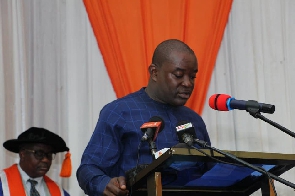Professor Ahmed Jinapor, Deputy Director-General of Ghana Tertiary Education Commission (GTEC), says stakeholders in the country’s education sector must collaborate to improve digital skills to successfully achieve the STEM-humanities agenda.
He said the country’s digital quality of life index, which currently ranks among others as the lowest in the world.
Prof. Jinapor made the remarks at the 11th congregation ceremony of KAAF University College in Gomoa-Fetteh Kakraba in the Central Region.
In all, 161 male and 174 female candidates, representing 48 per cent and 52 per cent respectively were recognized.
The event was on the theme: “Digital Life for socioeconomic change: The Role of Private Universities within the New GTEC Regulatory Framework.”
He said the survival of training programmes in private tertiary institutions and the sustainability of the institutions would be largely influenced by the quality of digital life within the community.
The Deputy Director-General said with Universities leading remote learning and the use of State-of-the-art solutions globally, their role in the promotion of digital life for socio-economic change was clearly cut out for them.
“In Ghana, the prevailing 60:40 STEM-Humanities national education agenda further accentuates the matter,” he added.
He said beyond the need to bridge the infrastructural and manpower gaps, the intense demand for technology-based solutions and the Coronavirus global pandemic had brought about profound implications on education and skills agendas.
Consequently, he said Universities were expected to churn out graduates, who have the ability to find, evaluate, use, share, and create content using digital devices.
Prof. Jinapor said although the history of digital transformation went back half a century, it took a catastrophic event such as the coronavirus global pandemic for the average college to consciously begin a process of integration of digital skills in their everyday teaching and learning.
He said business, engineering, healthcare, and legal personnel, who join the workforce with high digital quality of life index with the ability to navigate advanced technology and work remotely were likely to be successful.
Prof. Herbert Kwabla Dei, the Rector of KAAF University College, said they were working in collaboration with other stakeholders to embrace digital skills and technology to ensure that the academic plans of their students were not unduly interrupted.
He said the University College had produced its first batch of Midwives to support the healthcare sector; a sector which was in dire need of professionals with skillsets.
The Rector said in an effort to churn out well-rounded, industry-ready and employable graduates, the College would continue to strive towards improving competitiveness in the world of work.
“We recently adopted a work-study curricular, making industrial attachment a necessary part of all undergraduate programmes at KAAF University College,” he added.
Prof Dei said the University had signed a Memorandum of Understanding for their Electricals/Electronics and Mechanical engineering students to visit KANTANKA once or twice a week.
He said they were leaving no stone unturned in preparing a fertile academic environment for the young minds.
He said in spite of the challenges facing private tertiary institutions in Ghana, and the current economic crisis facing governments, businesses and individuals “we have not relented in providing content, capacity and excellent service to meet the rising demand for job-ready graduate and undergraduate programmes.”
Prof. K. B. Omane-Antwi, the Chairman of the Governing Council of KAAF University College, said within the new regulatory framework, the College, having been around for more than a decade, was expected to Charter by 2024.
He said to successfully meet the set deadline, KAAF must be attractive and sustainable.
“Without a doubt, Colleges lacking substantially in the use of digital learning and State-of-the-art solutions would fail to attract a sustainable number of students to charter smoothly,” he added.
Prof. Omane-Antwi, speaking through a representative, called on Governing Councils, Vice Chancellors and Rectors, the Ghana Education Service, Industry players and policy think tanks to collaborate to ensure that schools in Ghana play their role by prioritizing efforts towards improving the quality of digital life in Ghana.
General News of Sunday, 11 December 2022
Source: GNA

















